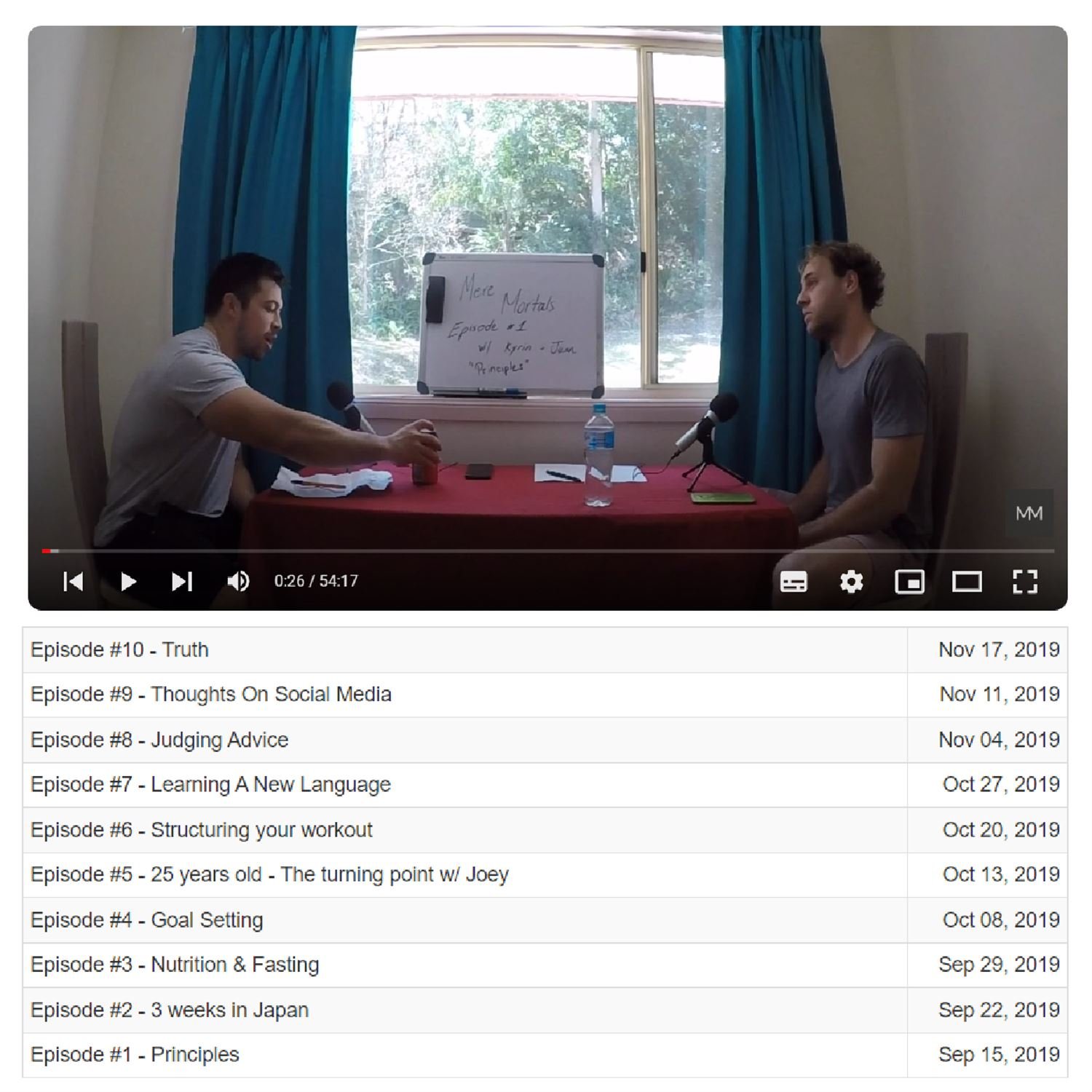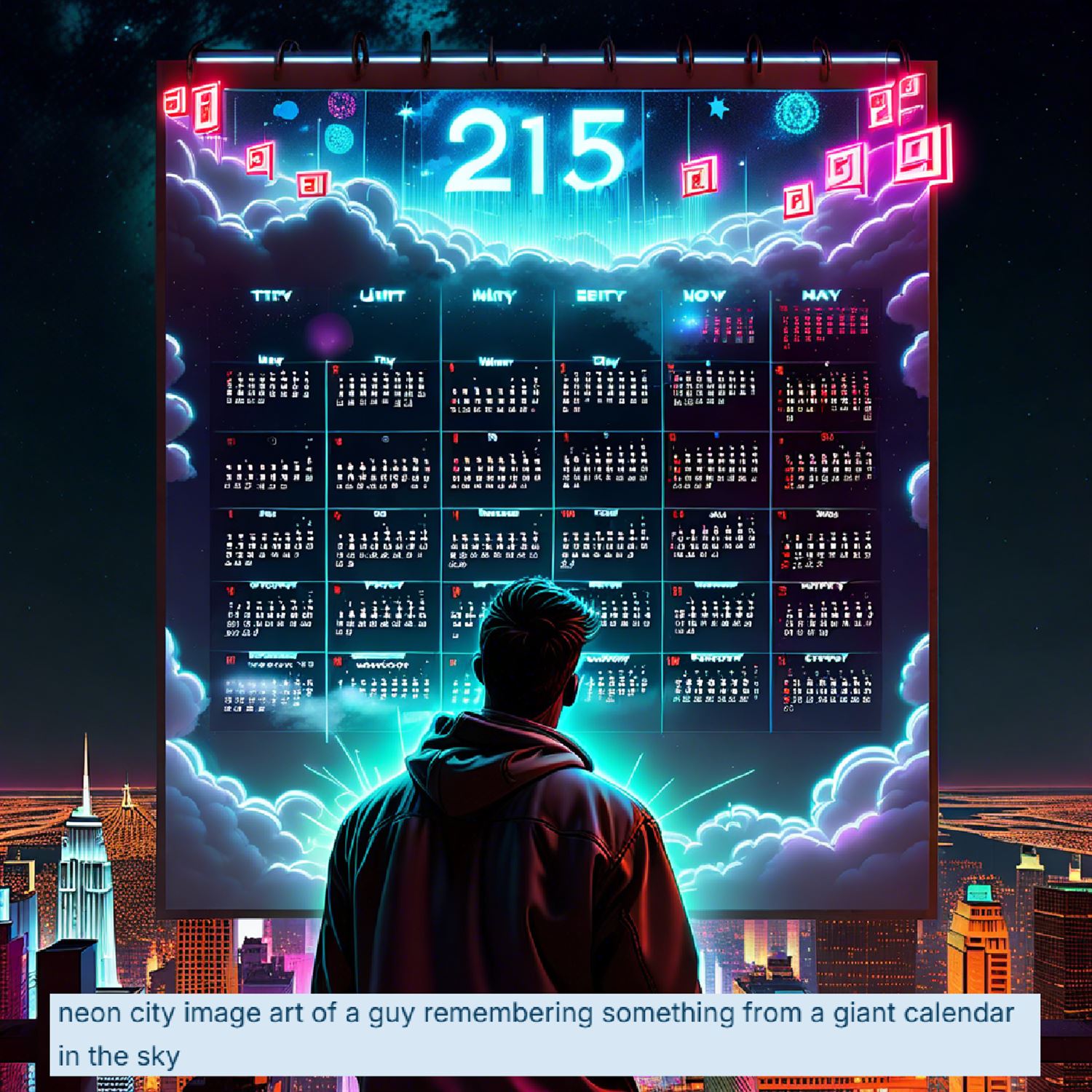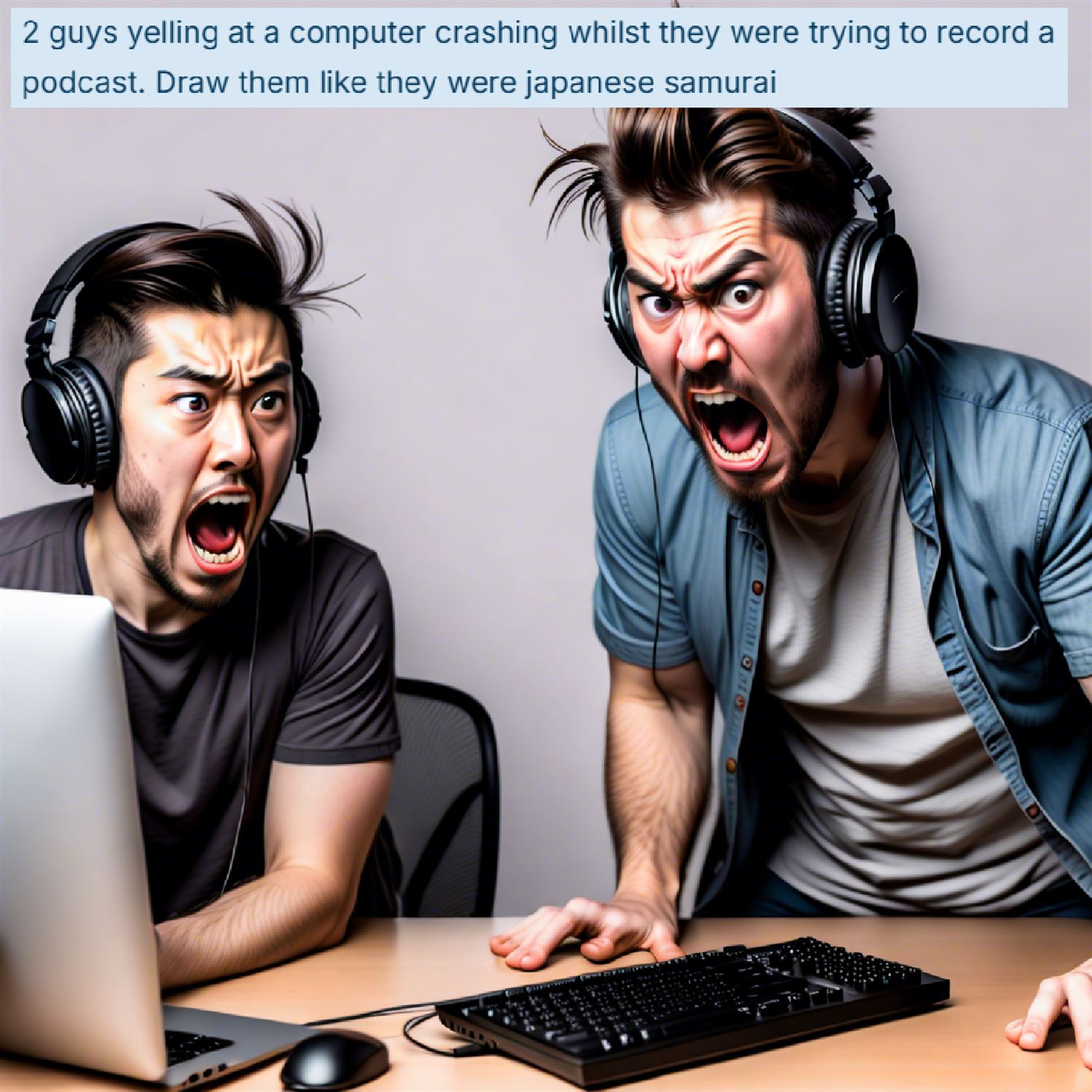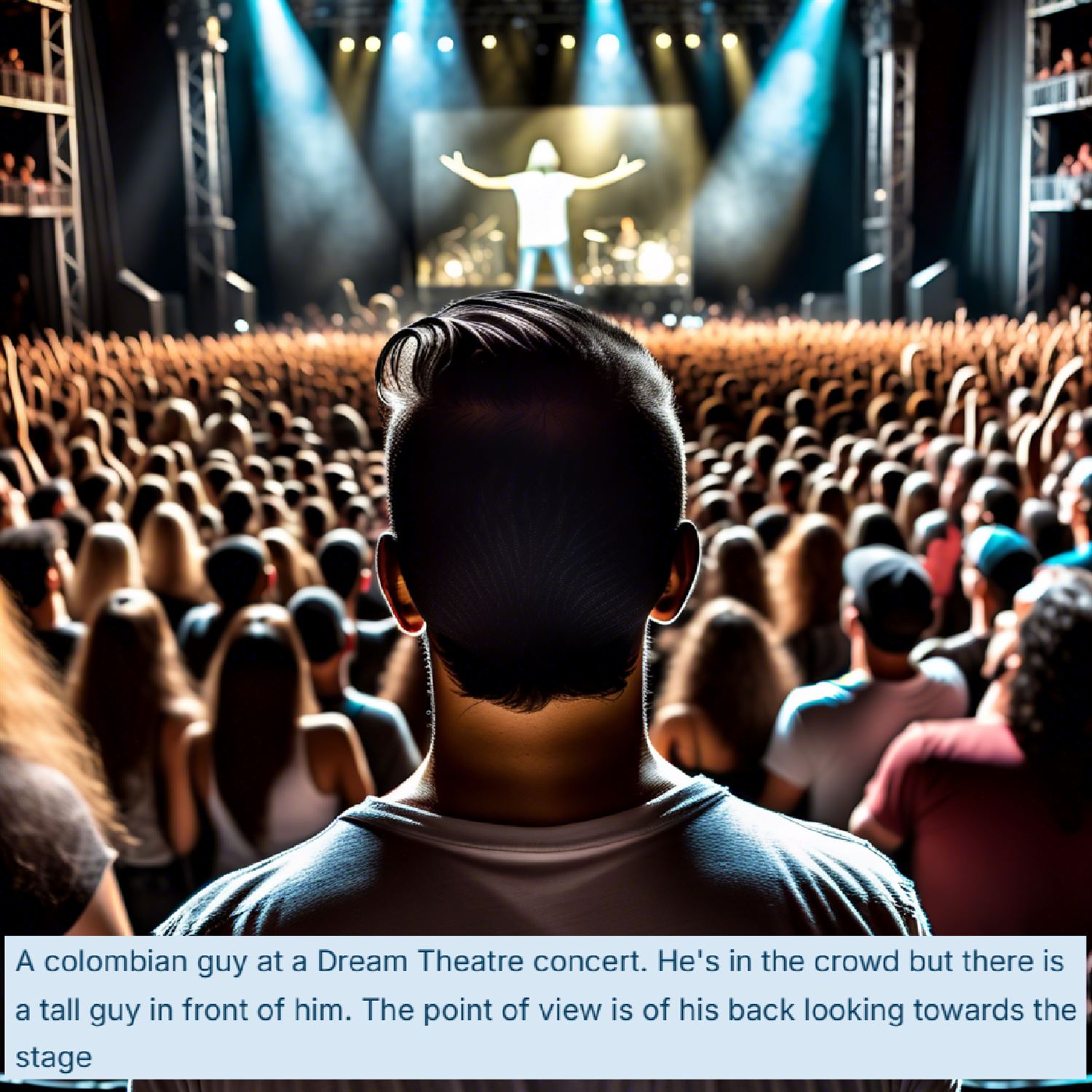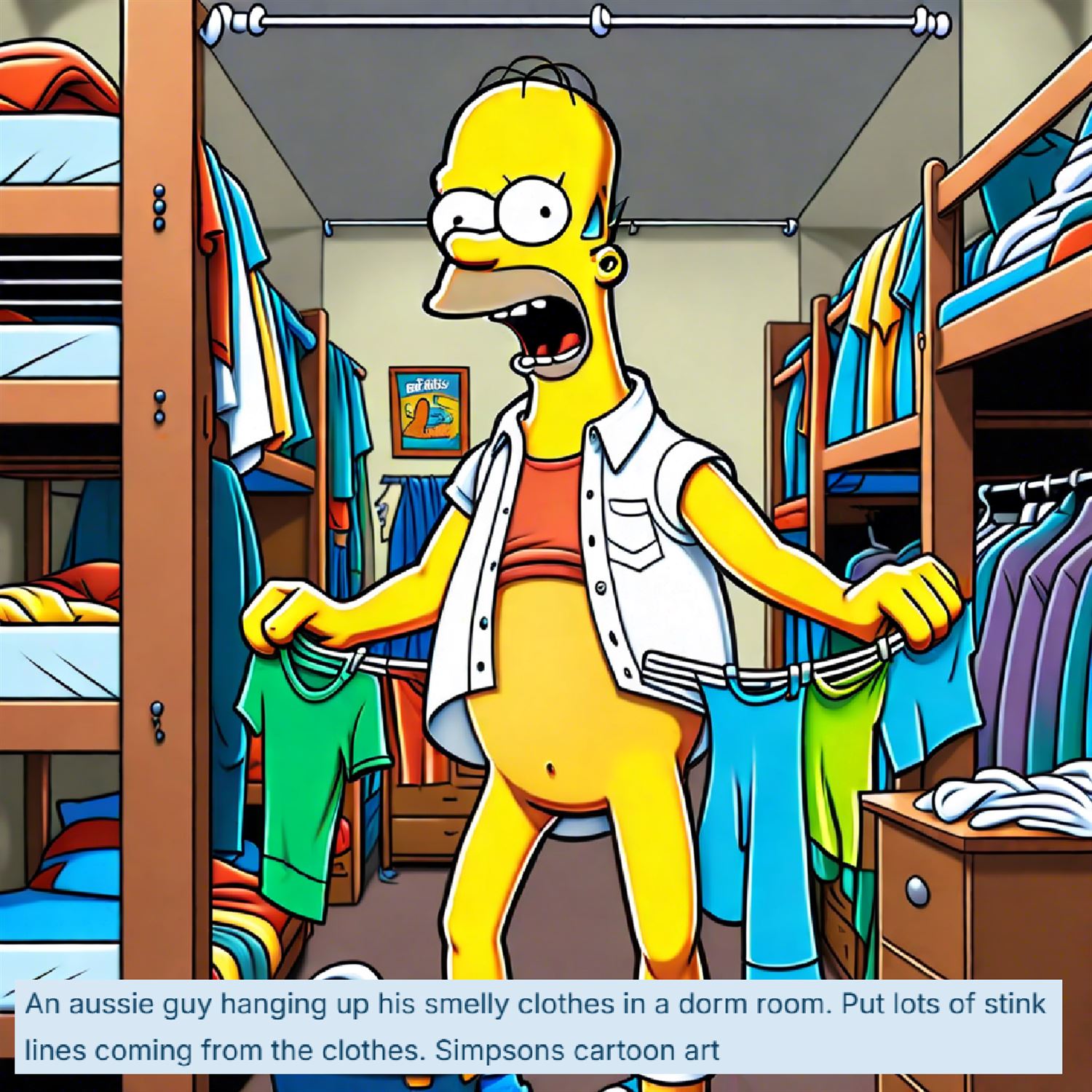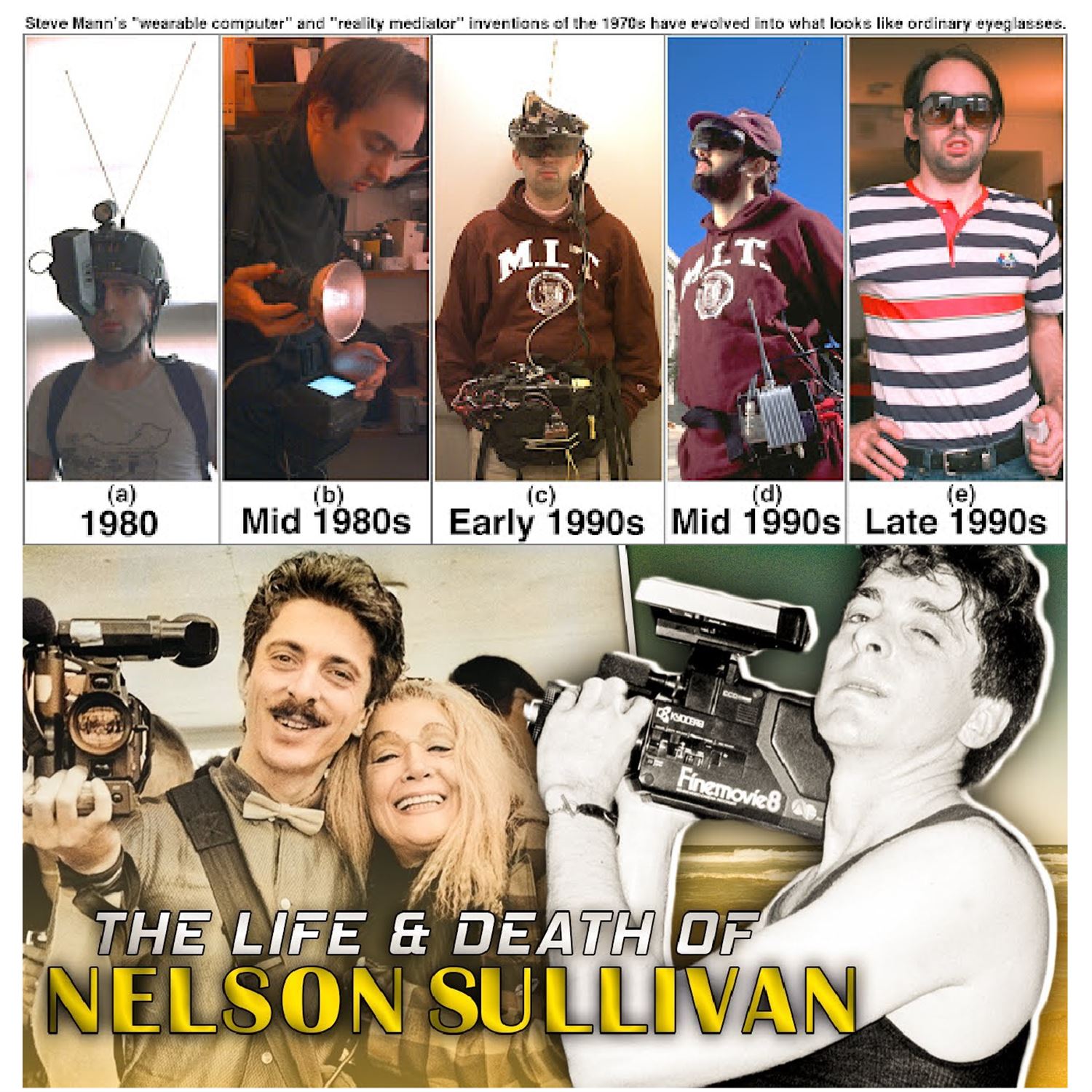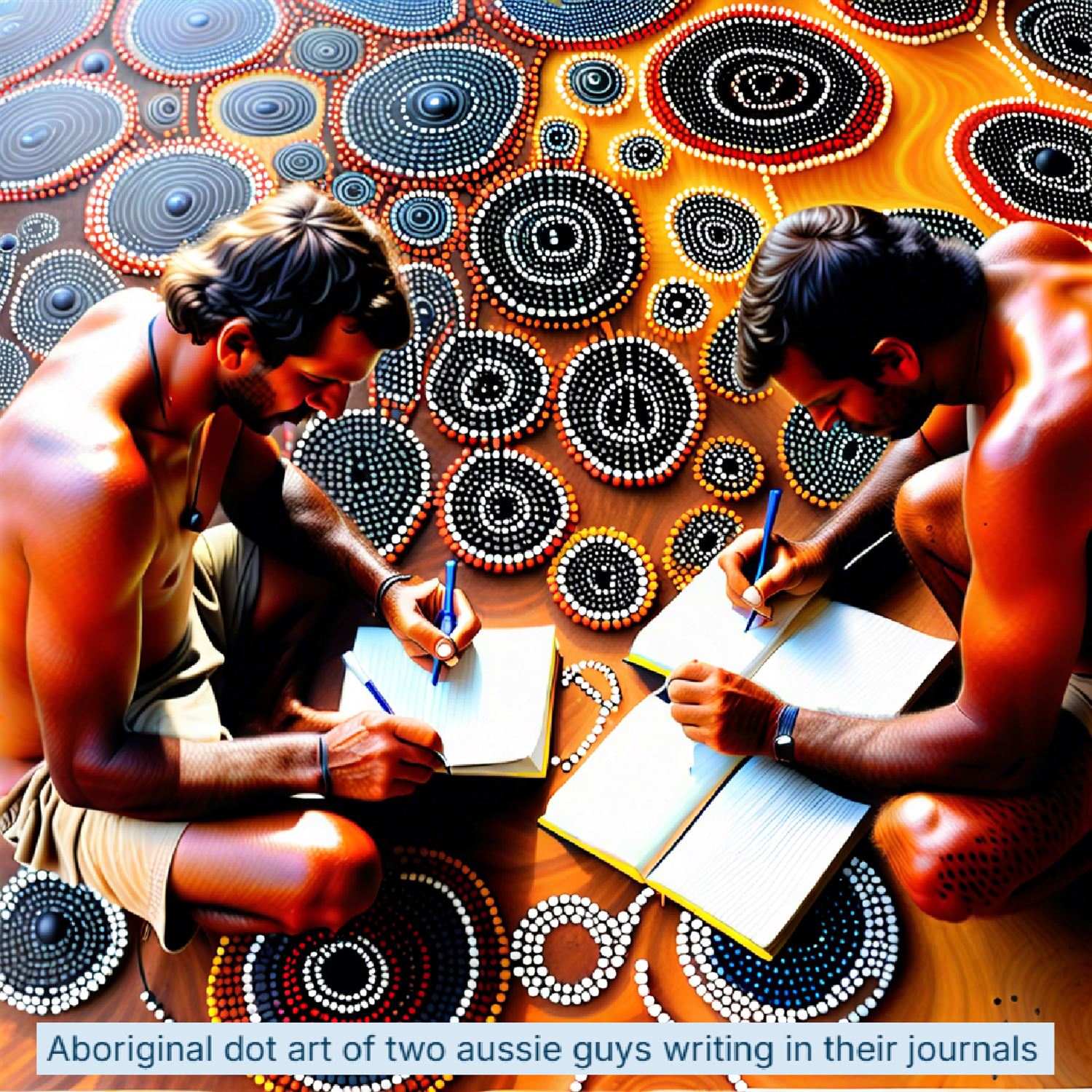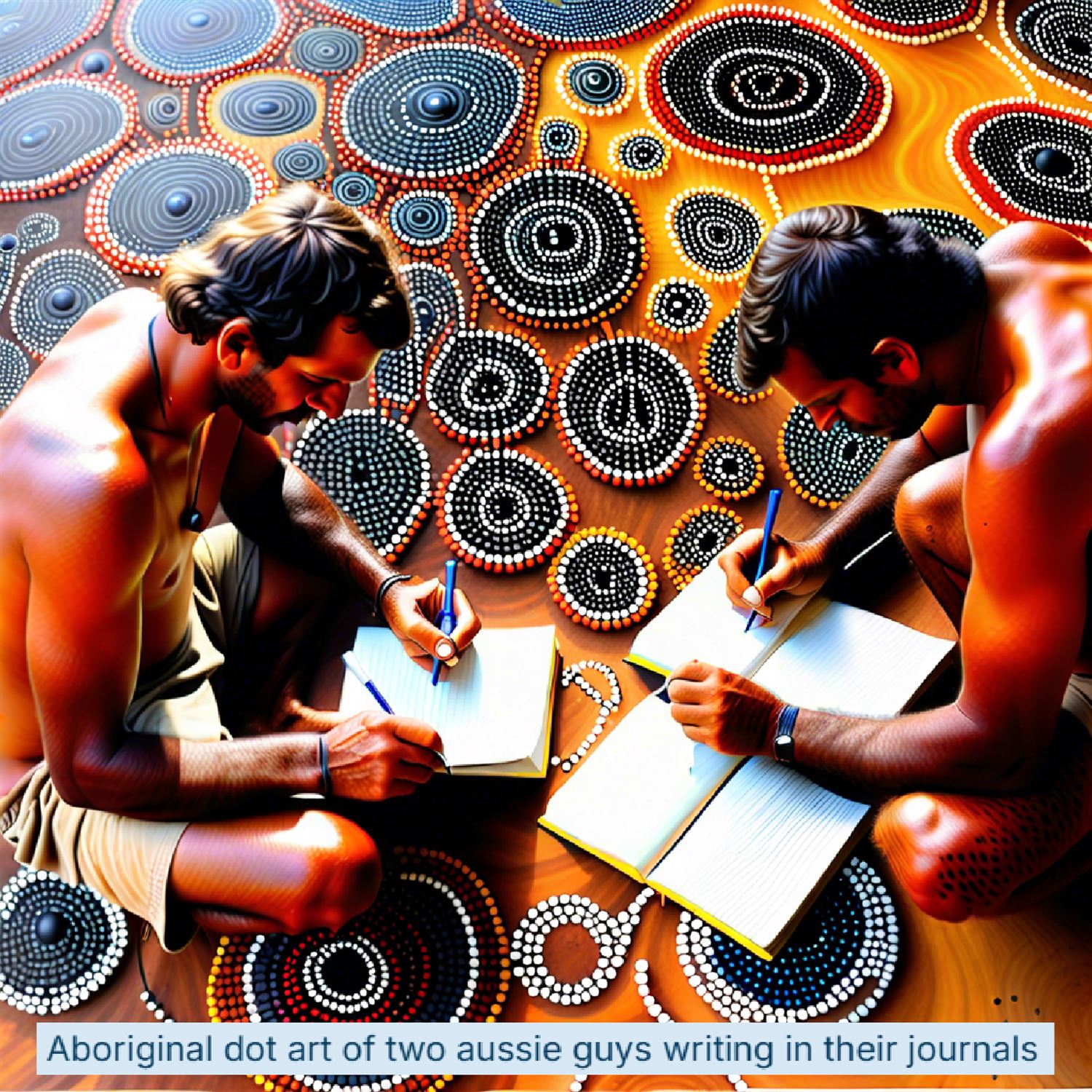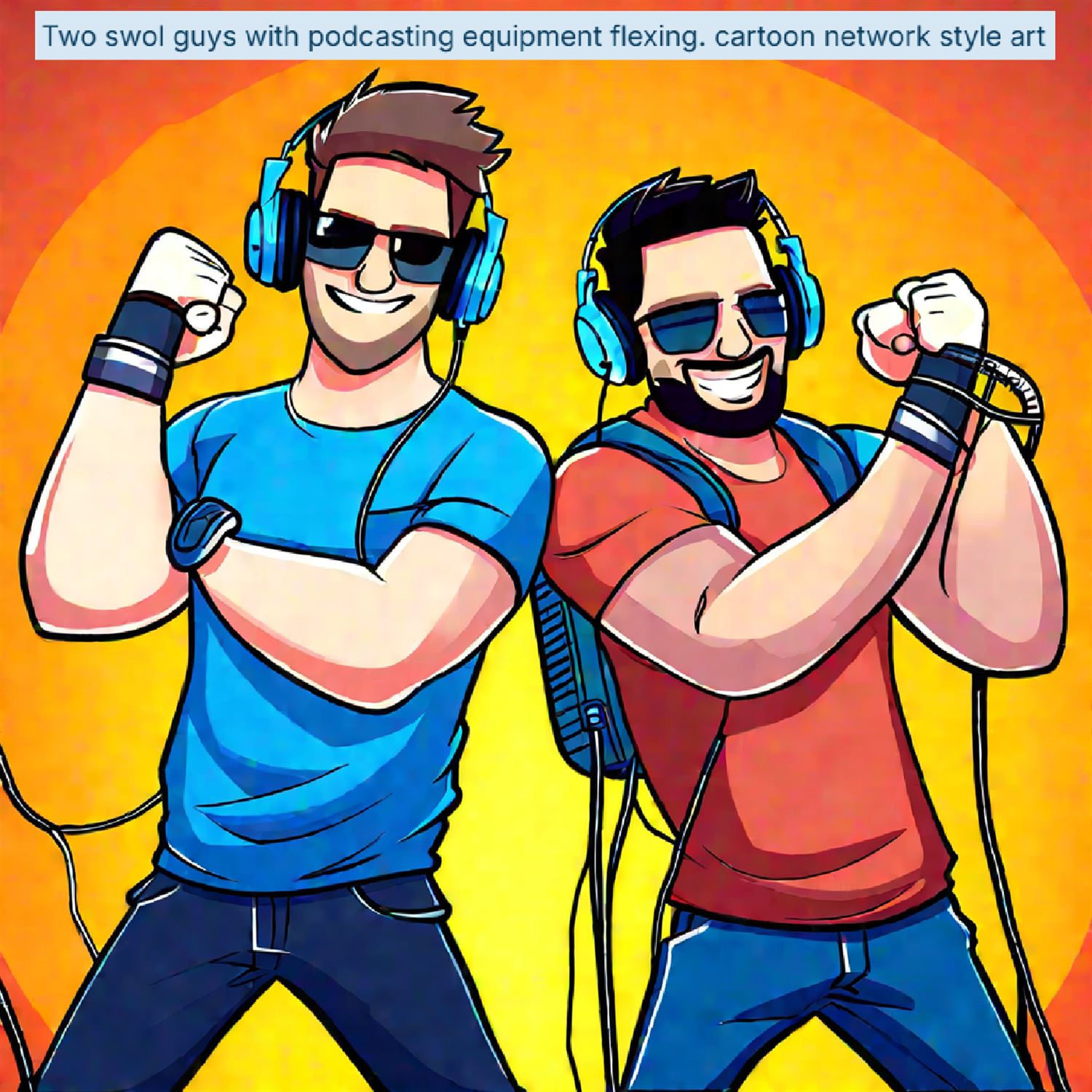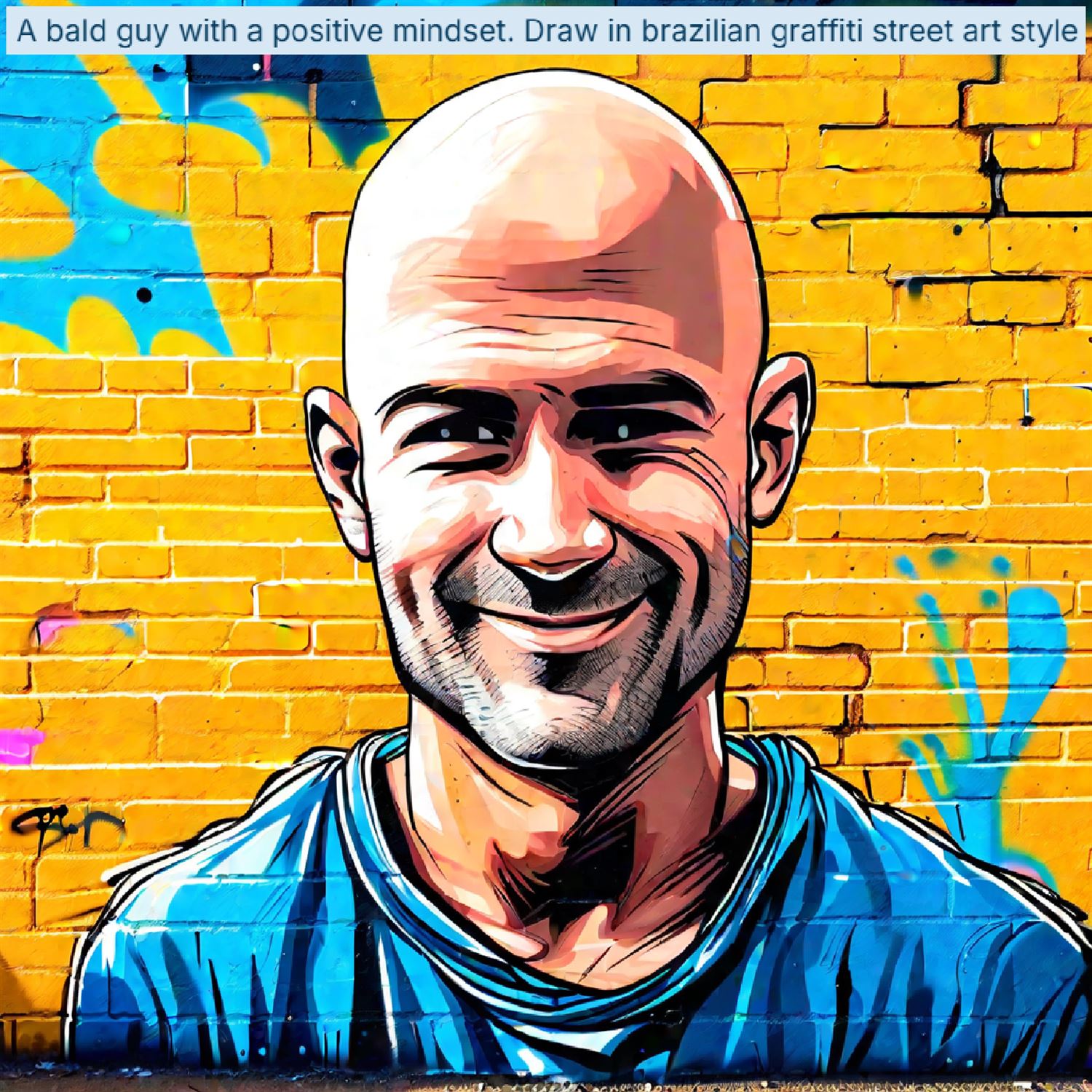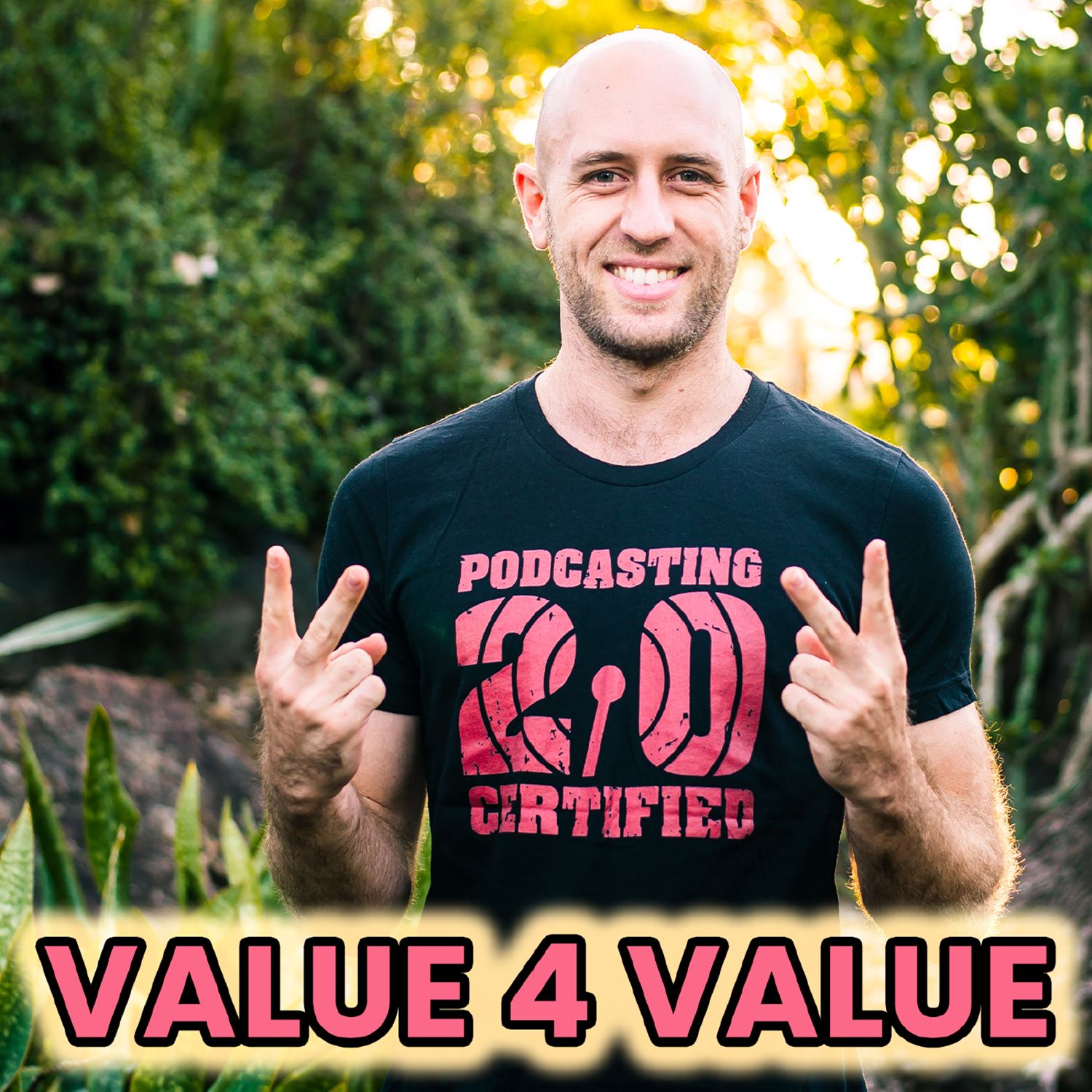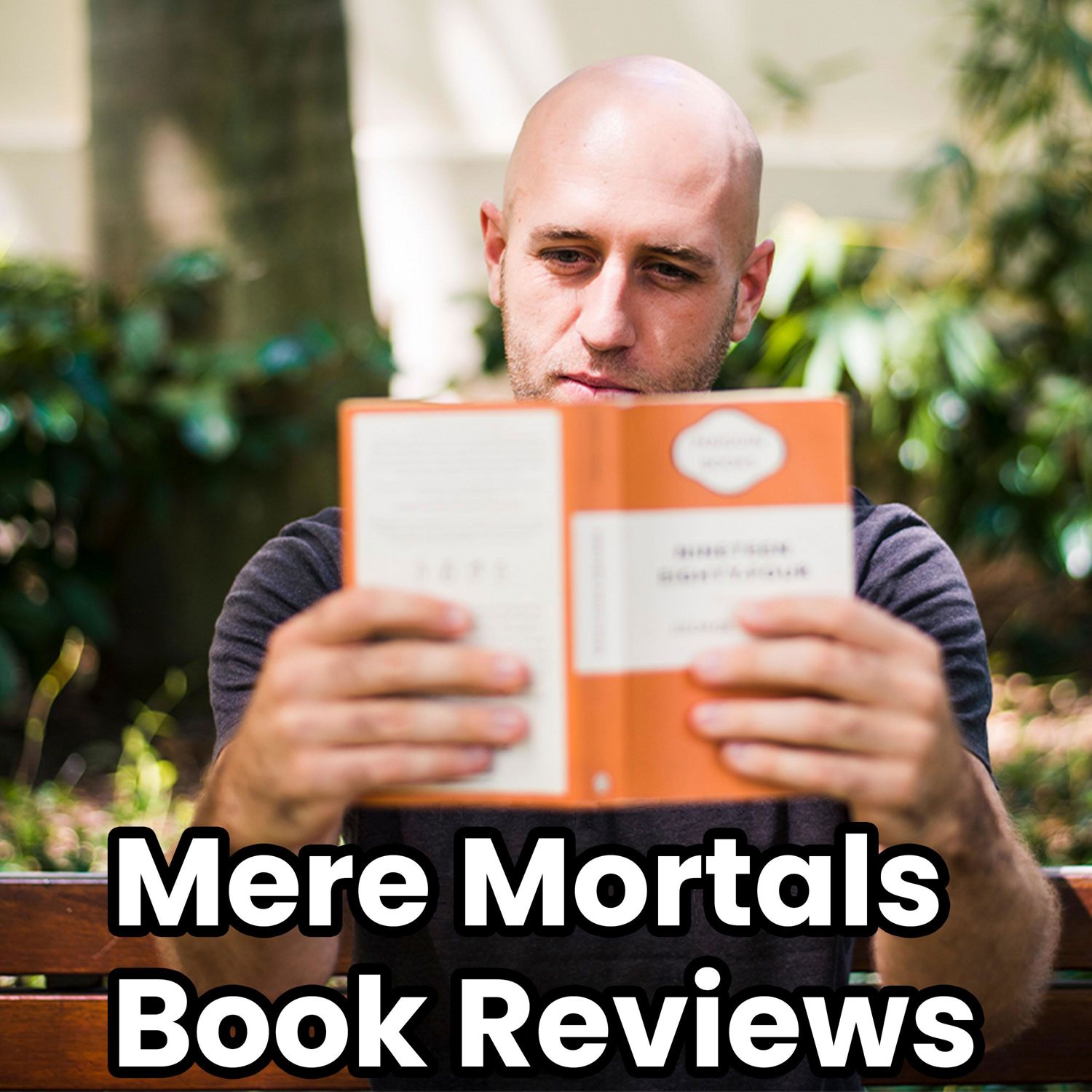How do you divide up the time periods of your life?
In Episode #457 of 'Meanderings' Juan & I discuss: celebrating our 5th anniversary of the podcast, techniques for remembering the past, why daily note taking may not help, my story of hanging up stinky clothes in a hostel, Juan being too short at a Dream Theatre concert, why a positive mindset can alter your reality and our plans for the next few episodes.
No support this week, very sad puppy :'(
Timeline:
(00:00:00) Intro
(00:00:28) Why is today special?
(00:01:36) Your first girlfriend's best friend
(00:07:15) Recalling actions on dates
(00:11:38) Different types of note taking
(00:16:35) Location location location
(00:23:56) Matching music with memories
(00:25:11) Kyrin's one weakness .... and grossness
(00:32:50) Recording every moment - Steve Mann & Nelson Sullivan
(00:41:59) You can 'over' journal Part 1
(00:46:15) Sad Puppy & off chop bugs
(00:47:48) You can 'over' journal Part 2
(00:51:21) It's impossible to stop this podcasting machine
(00:54:21) Positive mindset = good. Wowza
(01:00:11) Upcoming episodes
Connect with Mere Mortals:
Website: https://www.meremortalspodcasts.com/
Discord: https://discord.gg/jjfq9eGReU
Twitter/X: https://twitter.com/meremortalspods
Instagram: https://www.instagram.com/meremortalspodcasts/
TikTok: https://www.tiktok.com/@meremortalspodcasts
Value 4 Value Support:
Boostagram: https://www.meremortalspodcasts.com/support
Paypal: https://www.paypal.com/paypalme/meremortalspodcast
Hi. You welcome, everyone, to another episode of the Mere Mortals Meanderings. We're coming to you live from Brazil here on the 14th September 2024 in Brazilian time. Juan touching his mic
[00:00:19] Juan Granados:
over there in Brisbane. I hear how you going, man? Doing a 15th September. So I'm in the future. Brizzy Juan here. Hello, folks. Mere Mortalites Welcome.
[00:00:29] Kyrin Down:
And so does anyone and this includes one at home know why today is a special day? Come on, man. You got to get this one. You heard my heart if you can't get this.
[00:00:42] Juan Granados:
The 14th September. No 15th September
[00:00:46] Kyrin Down:
15th September.
[00:00:48] Juan Granados:
Not no idea.
[00:00:50] Kyrin Down:
It is officially the 5th anniversary of the podcast today. Let's go. Oh, exactly. On 15th. Mhmm. It was That was that was when we did. I did know that the very first September 2019. I didn't realize it was exactly on 15th. I'm pretty sure it was 15th. Yeah. So yeah, we, we're officially, 5 years in, which is kind of crazy, to be honest. And time, this this times very, very nicely with what I wanted to talk about today, which is I guess this period of my life ending. And I think for other people as well around me, I think it's like the mood gets in the air. And we're like, oh, there's a change of coming. I know Lucas in the chat feels this as well. So I wanted to focus on perhaps like, not not necessarily new beginnings. But if you're if you're going to look back at previous periods, and our own life techniques, methods that might be of interest and use to others. So I've been kind of reflecting on this a bit and, I wanted to get your thoughts on this. So if I had to ask you one, how would you remember what goes through your your head the process of recalling this information?
The name of the best friend of your first girlfriend? How does that go about in your head? How do you how would you work that out?
[00:02:10] Juan Granados:
The name of my best friend girlfriend?
[00:02:15] Kyrin Down:
No. The name of your girlfriend's your first girlfriend's best friend.
[00:02:24] Juan Granados:
I guess sequentially in my brain goes to remembering who that firstly who the girlfriend was. And then secondly, what her friend's name was.
[00:02:35] Kyrin Down:
So it's it's pretty basic. There's no there's no complicated series of maneuvers that you take to get there. So for example, you're not you're not going okay, well, you know, my my first girlfriend was I met her at like the soccer school yard or something she had brown hair so that helps me remember her name her best friend had brown hair as well His name was x. There's there's no like complicated series.
[00:03:05] Juan Granados:
Correct. No no complicated series.
[00:03:08] Kyrin Down:
Okay. Because I was asking this to to some other people, very similar question. And I was going, okay, for me, I actually tend to do things based on location. So what immediately goes through my mind is, okay, my first girlfriend, I met her when I was in MacKay. And so that was around 2014. And so I would have met her. It's it's actually, I looked at some some, old notes of mine, recently just going over some old, not yearly goals, but it was kind of like year end review that I've done in the past and then I can't believe how much I used to write write down old Kyren was crazy. Or I guess young Kyren was man that guy write down as in like on your on your journal. Oh, yeah, man. I just I have so many notes as crazy. Just going through these old folders and being like, damn, man, I wrote I had notes about motivational things. I had notes about yearly stuff, I had notes about monthly stuff, I had so many just varied notes going on.
And, and yeah, help it actually reminded me of a couple of things that I'd completely forgotten that I'd written down or done in the especially 2013 2014. And I might tell a couple of them soon. But yeah, my my process almost goes like location, time, person, and then link to that person if I if I had to answer that question. And so I find this just kind of interesting going, okay, so this is this is how I my brain sort of works with recalling information. And, you know, when I get to a later stage in life, I'd like to be able to recall more things from my life. It's certainly be a shame to get to, like, age 80 and just go, like, damn, I've I've forgotten what I used to be like at 26 or what I was what I was kind of doing when I was 33 years old or for example.
And so I'm kind of trying to develop some some tools and techniques to to help me remember better in the future. So because I think it's it's kind of fun and nice looking back nostalgically upon these things. So do you do you have any have you thought about this at all 1 and is that something that would concern you or or be a blip on your radar in the future?
[00:05:39] Juan Granados:
In terms of well, this is the thing. The the memory recall depended on some things, I guess, moving forward, especially now that maybe I'm a little bit of on the in inverse. Right? Where if I go back and review things I was noting down when I was younger, like at around that time when I had my first girlfriend, it was negligible. The most I was noting down was more so on the front of training. That was really it. And now as time has progressed, there's a lot more things that I'm documenting and noting down and putting together more tools, more practices that help me remember more remember more. So as far as it can be in terms of what I'm doing to try and support it, kind of maximizing for that. So I worry less than I'm in in forgetting certain things.
But I would also I'd also be willing to say that it'd be there's going there's almost an expectation that I am going to forget certain things, even if they are real big highlights, that I might just not capture and kind of being okay with that being that being totally fine. Like, if if in kind of that question, the original question you posed of, you know, if in 15 years time, I couldn't recall my first girlfriend's best friend's name. Yeah, I couldn't give a rat ass. Right. Yeah, correct. So an important cares about that. What about the point of Vienna's first baby steps, for example? Let's say Vienna's first baby steps, for example. Is that something? Well, and that's the thing that that's that's the thing, right? In terms of the way that I've structured the way that I'm learning now, there's certain things I'll be able to recall no matter what, whether it's actually in my brain, whether it's just purely going and having a bit of a look. So in fact, I could let me just open this up quickly.
I could tell you very, very, very, very, very quickly, kind of like almost exact day that that actually happened.
[00:07:45] Kyrin Down:
So the first day that Vienna took steps was the 7th February 2024. Now you're looking at some sort of note right now, aren't you? Correct? Correct. Now, if I had asked you that, to do that without the note, do you think you would have been able to? And does this mean that you're now dependent on notes for a lot of memory recall and things like this?
[00:08:09] Juan Granados:
On the specificity of the details? Absolutely. So there's there's differentiation. Right? There's recall of where exactly I was and when the first steps were taken that I could have taken and told you without going and referring to the notes, but I would need the reference for preciseness, like the exact date, the exact way I slept, what I felt on that day, you know, stuff like that. I probably I'm not gonna be able to recall, again, 12 15 years in the future. And that's definitely something that we need to write
[00:08:45] Kyrin Down:
down. Yeah, well, yeah, I mean, I another kind of hyper little hypothetical I had was, what were you doing on July 31st 2010, for example, if if you had to try and recall that from memory, what how how granular do you think you'd be able to get with that?
[00:09:08] Juan Granados:
Not very well. The the only way actually because in the end, so without any notes that I have, it would have to be just a really large ballpark estimation that I could I could not inspect any of the details of that particular day. It would have to be just a guesstimation of what I was doing in that year to kinda get a guidance. The only possible way would be of the note taking at the time would would have been my gym session. So perhaps I could have reviewed my my gym notes and kind of position myself in the day. But apart from that, not at all. I mean, from for yourself, would you be able to do any level of deep contouring of the day? Yeah, not not particularly
[00:09:53] Kyrin Down:
I I'd probably need some outside information. So my mind would go, okay, 2010. That was when I was in my 1st year of university. So July, assuming, you know, then I'd kind of go like, alright, university typically went for 12 12 weeks plus some extra weeks for revision and then the exam. So let's just say that's probably 4 months that usually starts in March. So that'd be like March, April, May, June. So that means July would have probably been an off month. So I probably would have been on holiday and, soccer might have been around then. So it's potential. I was thinking about soccer and yeah, once again, on that actual day, if I brought up the calendar and saw what day it on, I'd maybe be able to go like, okay, this is where I was at in my life.
These were the type of things that were important to me. So a typical day probably would have been. So for example, for for me back then, I was definitely more more of a shut in. So it's very likely that I and my sleeping schedule was really whack. So I would have been staying up super late, probably watching some anime or some manga or something like that. And almost certainly eating pies for lunch, because that was like a pie phase in my life. So so that I can get a bit of specificity, I think, but not Yeah, once again, like, does it actually matter if you can find out what you were doing on that day? No, that's that's that's kind of a bit beyond the point. But I do like the ability to be able to go, okay, yeah, I was in this rough stage of my life. And this is kind of what I was doing back then.
Actual note wise, yeah, now that I've got kind of some journaling, and then the podcast as well is immensely helpful. So for anything, looking back into 20, 2019, September 15, 2019 and beyond, there's a lot more data points of of note taking or things that I can reference than I have previously before that.
[00:12:00] Juan Granados:
Yeah, no, exactly. I mean, that's that's kind of the my my view of it now in comparison to what it was before. Like, it would have been really awesome if I could have kept it like I did in the past. And part of it, man, part of it in that now I keep very, very, very short notes. And obviously, I can't see into her brain, but I keep notes on my daughter around what she's doing and what's been happening because you never know. It's similar to what we're thinking about. Maybe might be nice to or heard reflect back, you know, in many, many years time to go, hey, this is kind of how what you thought, how you acted when you're 8 years old. This is what it actually happened on that particular day. Not for recall. And and I guess this is the important thing because I would see the same with me. Again, does it matter what we did July 31, 2010? Not really.
The day that we created the the podcast, like we were talking about, September 15th. I can remember parts of that day when we when we very first did that and the computer crashing and having to redo it, all that sort of stuff. But it's, I think in reviewing things from the past, it would be at least I mean, hopefully others, it would be more important around, oh, that's maybe how I acted. That's how I thought. That's how I identified as opposed to, I I McDonald's. You know, I had 2 McDonald burgers. Well, I think the way that I'm noting and reviewing my days now, it's much more attributed to that. Like, I don't I've updated now, Karen, so that my note taking is there's 3 parts. 1 is a little journal of like, a little quick journal of the day because I was I was missing that. Actually, just putting a little bit of a, like, a timeline of what happens because I also reflect back on a previous day, whatever, like, years by, if I just added, like, oh, this was today's, like, learning or something. I don't have some sort of time on of the day.
Plus you say it's kinda hard to position yourself into that day. So now I've got, like, journal, learning, like a learnings section, and I've, stolen this kind of off the back of after I read, meditations myself. But I've been adding what I call, I think it's just I call it philosophy. What I call it? Philosophy. Oh, sorry. Gotta go back. It was like, like, summarized today with a philosophical philosophical retrospection on the day. And what I try and do there is just amalgamate everything of a day into kind of, like, 1 or 2 short sentences. And that that in itself is what I hope, you know, again, in 10 years, 15 years time, when I'm reflecting on it, that gives me enough of like, oh, yeah, that's what I was like, this is how I thought maybe this is the type of mental state I was in in that particular moment in time, because I think that's what's most important. Are you going to get lazy and get AI to do that for you?
No, no, I don't I don't for that particular note. So the daily notes are this I think it's important with AI usage. Even with and I tried it, I tried to just like, oh, like, I'll quickly type it into AI just to see if it, like, summarizes the day for me. But 2 things happened. 1, when I do it myself, just just like this is common knowledge, but I just kind of recall, and it helps the immediate action of why I do it rather than getting AI to do it. So I there's there's kind of no point to getting AI to do it given that a lot of the benefit is me reflecting on the day before and picking up the learnings and just generalizing it in my mind. But 2, and look. This might this might change into the future. But honestly and you may maybe me and mortal, you've seen this on some sometimes the way the current talks and and produces some of his notes. I remember the ones that you produced from the previous episode around Brazil.
Honestly, AI just doesn't do it well enough yet. You know, it still seems clunky. It still feels a bit robotic. It doesn't feel like it's got soul in its writing, where the way that I can write still now, I'd still say it bests it in this in the soul and the feeling of what I'm trying to convey versus sometimes it just feels a little bit too robotic to clean the touch gpt or other equivalents.
[00:16:11] Kyrin Down:
Yeah, absolutely. And this goes to the and so what Juan was referencing there was the chapter art, which is Yeah, if you look at it, it's just it's just it that those actually took me a little bit to create. They weren't just one one attempt and done. It took actually multiple iterations to try and get them and they're not anything special. Why I'm reflecting upon this is what I've noticed is I have actually really I'm surprised at how good my recall is based on location. So the time period from 20 9 18 to 20, like mid 8 mid 20 18 to mid 20 19. My recall is pretty damn good. I'm actually so surprised at how accurately I can pick where I was and those on those ones, even kind of what I was doing on those days. So and the reason for this is because I was traveling a lot. And so I was moving from one location to the next very rapidly.
Going from, you know, hostel to hostel city city country to country. And what I've kind of find interesting about that is like, damn, I can actually really recall with that as well, the the type the type of mentality I was going through the types of thinking I was going through back then, which and those are the things that I find valuable looking back and going, oh, okay. Yeah, this is this is kind of what I used to be like. And what was that helpful or not for my life? It helps me remember some really great moments, some bad moments as well. And I just think the more moments that I can vividly recall, and in particular, the feelings, not necessarily, once again, doesn't really matter what I was doing on the 29th August of 2018.
But it does make me I just get get more. How would I say it makes me feel like my life has been lived more in a sense if if I can remember these things, which is made me think like, oh, damn, maybe that's something I need to introduce more into my life of, or have it as more of a constant companion of, of just traveling, honestly, just just going to new places and experiencing new things like that. Because it is, it does seem to be so dependent on location, not necessarily people I was with the types of things I was doing how I was feeling. A lot of it is just this is where I was on that day. And then that helps me helps me recall things.
[00:18:56] Juan Granados:
Yeah. Yeah. No effect. I was trying to think if if you would divide it into is it locate I guess location location does help. You know, what is the cause that location is a thing that helps you to remember more vividly things? I think it's the the difference, like the delta from the the norm that your brain would be used to. So then be able to put some more specifics into that day. Because I guess for me, over the last couple of weeks, when I say it's been full, it's been full of things to do. But I have been largely situated in same sort of places that I've been the last couple of weeks and months before that. So if I went back to the last couple of months, I honestly right now sitting here wouldn't be able to, like, it all feels a little bit muddled altogether. Right? Like, it's all kinda conjoined together into similar similar days. However, it takes me until I review if I if I wanted to review some of my my notes then to be able to space that out and actually see the detail. However, even in that where locations really haven't changed, it has been experiences for me that have allowed me to recall really quickly things. So, you know, even though I've gone to the same pool with my daughter for swimming lessons, I can very vividly recall each one, every single one of them down to very, very, very, very, very specifics.
And I think it's because the experiences each time have been that different from before as well. So I go, you know, yes. Obviously, an environment change helps, but I think it's it's because the environment change causes a delta to the existing present thing that you've been doing or past doing where, you know, I think if I, yeah, did something lessons for with her maybe 200 times, maybe it start to muddle up a little bit because then it's the same environment without too much of the deltas and experience.
[00:20:57] Kyrin Down:
Yeah, this this is also true. But I would also say, I, for me personally, there is just something extra special about location, though, because when I am traveling, a lot of time I'm doing the same thing, you know, I'm, I'm training the same, I'll sometimes be eating the same, the routine can actually be very structured and very similar to what I will be doing back home, for example. But there was certainly periods where I was, you know, testing out breakdancing, or I was going to this run club, or I was, you know, donating blood more often and things like this. But they were all just in my mind, they're kind of all just muddled up into that was 2020, 2020 through 2023, 24, even so it's almost like there's just kind of 5 years of, of a lot of a lot of static in my life it and for me, those years are probably some of the hardest years for me to really recall.
Even though there's the the quote, they're certainly closer than previously one previous years, just because I was in the same place, seeing in the same place, I think it is. So this is this is where I once again, just getting back to those old journals I had, it was actually really nice reading some of them and read and realizing, for example, that I actually did some promotional work in 2013. In the 3 month gap, 4 month gap that I had from finishing uni into starting my work in in February of 2014, working in the coal mine. And I went holy crap, like I had completely forgotten that I did that. But now that I've read it here, I do remember joining up and then actually going to this Christmas party, you know, having only worked 3 shifts or something can and being part of being part of the company, even after only working 3 shifts.
And so there is some value for me certainly in in recording things more in a what would you call this like just a, almost like a dispassionate manner of going, Hey, this is what you actually did on these dates as well. Because it can bring up some information on myself that I I had forgotten and which which I actually do kind of find useful. I find that a really fun fact going like, oh, crap, like, yeah, I remember that that version of me and what he was kind of what he was about what he was up to, especially when I had explainer explanatory things of kind of the internal self consciousness that was going on, which probably would make awful podcasting, but would is is much more useful in terms of reflections and going back to things.
How about anything else? Does music, for example, bring anything up in you that helps you remember feelings perhaps or, or even more concrete, more concrete memories?
[00:24:16] Juan Granados:
Think back music. In some parts, yeah. Very few. Like the the ones that just came rushing to me when you said that. Was it particularly music? Maybe maybe even not because the say one one of the highlights I was just thinking in my mind was when I went to go see Dream Theater at the Brisbane Convention Center. However, when I recall that, I thought I was recalling it because of sound, but it was more the exact like standing place I was and this tall person that was in front of me and I couldn't see something and the person that I went with. So I don't necessarily think that would have been either. So I don't think sounds play a gigantic part.
The this was an interesting one. I'll I'll play it back to you. What about smells? Because actually one of the most powerful recalls for a lot of people is smells, the different smells. And I can, you know, handle heart say I cannot recall anything from a, you know, nose or factory perspective, not even close.
[00:25:32] Kyrin Down:
I'll divulge my my biggest weakness to the podcast listeners at home. You know, this is this is my Kryptonite. This is the if you if you want to kill me, this is this is the information you need. I've got a terrible sense of smell, man. I I don't know if it's always been like this. I certainly remember. I don't know if this is, it's like one of those stupid random things I've always been able to do is if I turn my turn my lips to like one side as if I'm kind of like, smirking or or like have just eaten something really sour. And then I inhale through my nose.
I can make one of my nostrils just just kind of close shot. And it's I think that's because there's actual like some sort of blockage up in my my the top of my nose. I don't think that's you're gonna be like one of the you're gonna be like one of these stories where it's like you shove the crayon up your fucking nose when you're 4 years old, and then we'll find it when you're 40. I thought you were gonna say I was I'm gonna be one of those people like, Alex or Mosey or something. He's got that band on the nose, and they're just Yeah. They've got the nose patches open up. No. No. So, you know, is that related to sense of smell? I'm not sure. But I have a notoriously bad sense of smell, which has got me in trouble. Many a time where I've been wearing or have hung up, you know, like old. There was one time in one time at band camp one time in a Colombian hostel in Cartagena.
It is so hot there man just just balls dripping the worst humidity I've ever felt even worse than North, North Queensland. And so this is kind of the Caribbean type heat. Imagine imagine that. And when you're gonna be so disgusted everyone at home, it's gonna be so disgusted with this. So what I would do is because I was traveling, and I hadn't had a lot more just unnecessary shit back then I carried more books. I had my gymnastic rings that wasn't unnecessary, but they certainly weighed more. So I just had a lot less space in my bag for clothes and things. So what I would do is to extend my my clothes out, I would sometimes reuse things. Now I wouldn't, maybe I would even reuse underwear.
So gross. But I would, I remember being in this place, and I just got drenched with sweat. It was crazy. And everything I could have rung these these clothes out. And I also remember remember at the time being, man, if I put these clothes in, in my bag, those ones I'm like, I'm not going to wear again, these these are way too hot way to you know, way too drenched in sweat. But I don't want to put them back in my bag because they're going to be heavier. And if I do this, you know, multiple times, I'm going to be carrying around, you know, an extra kg or 2 of just sweat in my clothes in my bag before before I actually get them washed. And so I had bright idea, oh, I will just leave them in my in my fucking dorm room hanging off the side of the bed.
And that'll dry them out. And then that way, I'll I'll be able to, you know, store them up and put them in my bag, and it'll it'll be less weight. And so I did that, and I came back. Unbelievable. I came back from a walk, man. And I remember someone someone from the front desk is like, yo, dude, just so you know, we we like put your clothes on the railing outside the room. Someone complained of the smell.
[00:29:08] Juan Granados:
And I went,
[00:29:10] Kyrin Down:
yeah. Yeah. That would make sense. But but it wasn't me, you know, intentionally being a jackass of going. I just feel like doing this at the inconvenience of others. If I knew it smelled and was going to inconvenience if that had thought had gone through my mind, I wouldn't have done it. But because it didn't go through my mind. I did it. And so then I'm You were like, Yeah, of course. Yeah. And so then, of course, I'm the jackass who, you know, just stunk out his room basically. And funnily enough, that's probably only my 4th or 5th worse social etiquette that I've done in hostels. So
[00:29:46] Juan Granados:
yeah, more stories in the future for I like that it's only the 4th or 4th worth one. Yeah. Karen's got some. I've got it. Do you see that he's pulled on people, I guess. I've done a couple of bad things then.
[00:29:56] Kyrin Down:
But in any case, the that's a really long winded way of answering no smells don't don't know. Who have you heard this from? I've never actually heard that before.
[00:30:07] Juan Granados:
Huberman podcast and a couple of other places. I'm pretty sure that's where I pulled out the word olfactory. But so recalling memory with smell, it comes up with is, yeah, although we often look at pictures to remember the past, odor is actually better at helping us remember, brain scans show that odors bring us strong memories because the brain regions that process them.
[00:30:33] Kyrin Down:
Yeah. Okay. Well, I could certainly see the argument for it better than being better than pictures because I certainly have a lot of pictures from when I was traveling, but they they don't they don't necessarily bring back strong memories more than perhaps thinking of someone who I knew at the time or a, even perhaps even the taste of food probably do a little bit better for me. Music is relatively good because I tend to binge a song and then it that really captures it for that 1 or 2 weeks that I'm binging it and that links it to a time and a place in particular. So Kelly's tenderoni, which is a relatively average song in the grand scheme of things, certainly wasn't famous or very successful or anything, just, you know, would have been in the top 300 pop songs of 20 14, maybe, or 2013.
But I it can evoke some memories from that time where I'm like, oh, yeah, I can remember that. You know, this was this was Karen kind of emerging from his cocoon of, of, of university and going out into the real world. So sometimes music does that for me as well. And, but then, and then it's like, if I listen to it more in the future, it kind of eventually washes away those old memories because then I'm re listening to it. So it's kind of it's a it's a double edged sword where I can, it can make me remember some things, but I'm going to forget them. So maybe it should be better if I should just save up all of these songs to till near the end of my life where I'm more in nostalgic mode and wanting to go.
Man, I remember this from the past. I remember this from the past and then just just bulk hit them all at the same time. Perhaps perhaps that's the way to do
[00:32:27] Juan Granados:
it. Yeah, just one one final one final bring up. Yeah. Yeah. Like, because otherwise, then you get you listen to that song and let's say 7 critical moments and all of a sudden it's a hardship. Where exactly was that song that it made this pinnacle, like, emotional,
[00:32:45] Kyrin Down:
change or, like, note in your life? And then then it goes away, like, the specialness of it. Yeah. For sure. The last one I I wanted to talk about was, do you ever remember that Black Mirror episode where they've never watched any Black Mirror episodes? Okay. All right. So there's this guy who has the ability to basically ever and everyone does, who just instantly get something from their mind, chuck it onto a TV screen, and they can they can watch from their mind's eye point of view what happened a week, a month, a year, 5 years ago, and it just that it doesn't, it doesn't explain how it gets to that point. Because you can't you it's almost like, if you recorded everything, and there is actually a guy who's done this, I've forgotten his name, I was looking him up once He basically strapped a camera to himself and has recorded every moment of his life beginning, I believe, in the 1990s, which was really impressive because he was wearing a full kind of camera rig and came at a tremendous social cost because when people realize that that you're you're filming them that the interaction with them all the time, it can off offset people imagine if I just, you know, brought up my phone camera and was just holding it in front of your face.
Whilst I was speaking with you, you're gonna get weird interactions with people. Oh, absolutely. But he wanted to do this for I can't remember the exact his exact reasoning for it. But I think it's something was like gay gaining enough data, perhaps for even AI related things. You know, this was way before AI was was cool. In well, in at least in the the last the interest it's it's gathered in the last year, I think I know the guy that you're
[00:34:32] Juan Granados:
actually talking about. He's a mega nerd. Just just a mega. Yeah. Yeah. But but I had a quick little I did a quick little Google. And even before that guy, there was another guy, called John Nelson who was doing it, all the way until he died in 1981. Okay. 1983. Yeah. I'm not sure which one I was thinking of because No. No. I know the one that I think you're thinking of, which is like, I remember seeing a guy, like, strapping a camera, but Justin Kelly said anyone wants to check this guy out. His name is John Nelson Sullivan. And he chronicled his life in downtown Manhattan, arts and club scenes from 1983 until his death in 1989.
[00:35:13] Kyrin Down:
No, he basically
[00:35:14] Juan Granados:
carried a gigantic handheld video camera to video every single private moment.
[00:35:21] Kyrin Down:
Yeah, yeah. And when I say everything, I mean, these these things are going, I believe they've managed to do it 20 fourseven. So even even just had videos of them when they're asleep. Would that be something of interest to you? If you had, let's just say a modern day equivalent where you set up a little drone, or perhaps even, you know, eyeglasses, which just record everything, and it's not interfering with any actual interactions with other people, they perhaps don't know they're being recorded. You're the only one who knows. Yeah, you'd find no interest or value in having this information.
[00:35:58] Juan Granados:
Well, and see, I think this comes to the definition of. Information. There's a difference between information and knowledge. There's a difference between data and the connective points and make the data relevant. Right. Just because I'll give you an example. Just because I give you, you know, 22,000,000 data points on a particular company means diddly squat until you
[00:36:21] Kyrin Down:
doesn't mean you're together or you're going to get the stock price instantly
[00:36:25] Juan Granados:
or be able to. Yeah. So that's and that's where a similar thing if I could click with a finger. There's there's an extension to your I think to your question that would make it more, more relevant or I think maybe even better. But sure, if I had, let's just say, a video camera in every single room in my household and recorded it in 247 and saved it up somewhere, would that be at all relevant? I don't think I'd ever go back and replay any of them unless it was a, you know, 20 years in the future and you go, oh, do you remember that moment when you first took a step? Oh, you know, we can go look that up. Let's go look at the video. And and maybe you do that. Beyond that, though, not really. And and I guess the the reason I say that is there's no analysis.
There's no, resolution of what the moment actually means for oneself. It's the equivalent if you documented your video yourself 247. Maybe some people have some interest of some aspects of it. What the what the heck do I care about, you know, one moment that you had chat with a random person on the street on 8 PM. Right? Who cares? So it has to be relevant to yourself. And to do that beyond just something like being recorded, I think you have to analyze it or process it through your own mind. So in in itself, I don't think it would be useful. What it might be useful, and again, there's using AI or other things beyond is if you could somehow record yourself again, this is probably to some people would be like, woah, Hey. No way. I don't want to have all of this recording and analysis and whatever being done on me and my family or whatever it may be. Black hero. You could have, like, all these videos going or, you know, something recording every moment, and then it summarize it for you in a really clean way, maybe in the same way that you I'd like to recall it yourself. So, like, at the end of the month, maybe you get a little, you know, presentation created for you in terms of, oh, you know, this were your highlights for the for the month, and, this this really happened and it was good. You you drank, you know, 4 coffees less on average per week because of this, something like that, then maybe it starts getting, valuable or usable.
But, you know, there'll be some levels of extremes, but on its own, I think recording that that level of volume
[00:38:47] Kyrin Down:
is just a lot of data that you have to do something with. Yeah, that's a good point. The the only reason I myself would find any interest of in it is if someone else can analyze it and find patterns that I do or tell me things about myself that I didn't know, Which they could only get through through this kind of data and be able to pass it that way. Because yeah, sure. I can look at it. But there's no, you know, knowing that, oh, I drink less coffee on days that I'm going through my menstrual period or something like that. If if you know, putting myself into another person's shoes there. Obviously, then.
[00:39:29] Juan Granados:
Are you current?
[00:39:32] Kyrin Down:
I've got some news, Juan. What are you what are you not telling me about your Brazilian trip? Yeah, exactly right, I've got some news.
[00:39:41] Juan Granados:
Surprise, I can give birth myself now. Yeah, the
[00:39:44] Kyrin Down:
the this the Brazil trip actually is gonna have a big moment for me because, I've I've had a radical change. I actually was, you know, funny thing, the the thing that that went through my mind the other day was like, oh, you know, I was messaging my my dad and brother. I'm like, you know, first time seeing them in 4 months. That's, that's pretty long, pretty long time. What if I just got my face tattooed and just and just did it and then just rocked up and and just acted completely as normal. I'm totally myself, Kyran, except I've just got tattoos all over my face now. And what would be as you do in Brazil? Yeah, exactly. Right. Exactly. And then just be like, that's what you do.
But yeah, no, the the recording. I mean, I can see some value in it. Some people do tend to like the the Spotify recap the YouTube recap of this is the you know, the songs that you listen to in the past year. And I well, obviously, they that's and there's podcasting versions of that, as well. Some some of the podcast hosts do that. There's obviously some value in that because they wouldn't do it if people didn't like enjoy it and Facebook going, this is what you did on this day, you know, 5 years ago. So obviously, there's some value in it. But is it is it how valuable is it other than just a uh-huh. Yeah. That's, I remember that photo. It's not like it's going to trigger deep insights into oh, my God, I remember that memory.
And now I need to go find out everything else about that. So, yeah, I I personally myself and and more along your lines was, I I even if there was an AI that was powerful enough, I'd need to be pretty confident that it was confidential and and private and and not not being shared with the rest of the world, because that certainly is the kind of dystopian lens that some people would talk about. So yeah, that that's a that's a fair chunk there on just just memory. So hopefully that helps someone and maybe even help us our future selves. We might look back at this in 5 years and just go, man, that was so wrong. I'd want to record everything now. Who knows?
[00:42:07] Juan Granados:
Maybe, perhaps perhaps. But I think, again, the the more you you have to process, the better you have to process it with with something, right. So it's kind of the right now the way that I try and document the things that I'm doing in general life, that had to put some sort of processes and techniques and whatever to to recall, to summarize. Otherwise, there would just be so much noise that it's almost like, what's the point of me doing this? Right? Like, what is the point of me doing this? Because I'm never gonna recall it. I'm never gonna relook at it again, whatever. So the more and more and more if I was if I was trying to document many more time, many more hours of this, it's sort of like, yeah, it becomes pointless unless I elevate the way that I'm trying to recall things. Yeah, I mean, I've got a journal from June 5, 2013. That was the first day I started writing this. And
[00:43:01] Kyrin Down:
that was also incidentally the first day that I ever did a cold approach on a girl. So and was that actually the first day I got a girl's number? 1st day I got a girl's Facebook for sure. But in any case, important day in my mind because obviously I remember it. I haven't gone back to that journal and I meant I was writing in that every day for a fair, at least a year, I think, where I was I was doing daily entries, and then it moved to weekly. And then nowadays, it's it's monthly. And the monthly ones, there's still a bit of info in there, but it's certainly not as granular. How much of that have I read almost 0. There's almost 0 in there that I've read. But, man, I know I'm gonna go back to that one day and read through it and just get a whack in the face of of the past version of me because I wrote the the highs, the lows, the darkest secrets, the everything, everything went into that journal for a bit.
Also my second kryptonite. So if you if you obtain that journal, man, if I don't know what you're gonna think of me, I don't know what I'll think of myself honestly reading that. Because there's, there's certainly like, I know, there's hot a lot of highs and a lot of lows in there. So it's it you'd probably think it's a schizophrenic honestly. So there is there is value in recording things in a kind of artificial manner as well like that, you know, which is recording it through through just spoken word like we're doing now with the podcast through text, like I did, then keeping some music set aside, things like that, I think. And honestly, the one one kind of like little outcome that I've had from this is, is more of a affirmation that travel is there's a reason why I travel. I like to travel and that it probably will continue to play a pretty big part of my life.
I don't think I'm going to be the type of person who stay in Australia for 4 years again, and not and well, 4 or 5 years during COVID and not leave the country. I don't think I'm going to be that type of person anymore. Because honestly, when I look back at that 4 or 5 years, it's yeah, it wasn't there's other reasons for it. But I was also wasn't like the most memorable or greatest period of my life then. So
[00:45:30] Juan Granados:
so yeah, you got to do the things. Yep. Go do the things that help you help you find a memorable life, man can't be doing the same thing as the old trite saying is that, you know, was it for you? You live the same life, same year 80 times. Can you really call it a life? Okay. I haven't I haven't heard that one, but I I heard that before. Yeah. It's basically like, you know, if you're doing if you're doing the same thing over and over again and then you just multiply by all the years, at the end of it, you're really gonna call that a life. Yeah. Makes makes sense. I think it's gonna be there's gonna be enough variety, enough differences, enough learnings, enough whatever, however you want to see that whether it's growth or whether you see it as as variables.
Otherwise, you just what you'd see stuck in a rut. The other thing before before we finish off as well,
[00:46:19] Kyrin Down:
2 parts I was gonna say from a boost screen perspective, man, I wasn't gonna jump in there because I don't think we've got any No, we don't people got a sad puppy dog indeed for this week. We dog in these I won't I won't call that we can call it out at the very end. I'll actually gonna I'll bring up this one from just just Lucas write some stuff in the chat. He said, bro, I need to agree with you about the bugs. I went for a run and was so bad after 5. We mean 5 pm Fuck the bugs. And then he says, because you are magnificent. Let's go. Yeah, man, the bugs in Brazil have been wild. I've been been eaten tremendously these last like this last week has just been off chops. Really, really hard to enjoy being outside between 3. For me, it's like 4 Yeah, 44 to 6 ish. Is is been pretty nasty. Yeah.
[00:47:10] Juan Granados:
I love I love I love them by love. I mean, I absolutely the test bugs like that, man. I hate that. Yeah. No. The the final point is gonna say as well on any of the recalls as well. And and if you listen to this and you're like, you know, maybe I wanna note things down or record things. The only other thing I'd actually say is don't run into the problem that you spend a little bit of energy, but not too much energy, and then it becomes actually just useless, like useless information. And I can actually give you an example here. I went quickly back to this is the 26th April 2020. And at that point, I was noting down my rankings of the day for mind, body, and soul, like out of one to 5.
I'm gonna give you a good day. Mhmm. Right. A good day. And here's here's the comment that I put. So basically, the mind was 2, body is 3, soul is full. I don't know roughly what that means, but this is my comment on the day. Undertook the podcast with new equipment, met with friends, did 2 sessions, a good leg one and another in stairs where I pushed. Eating was also great. Do you think I can recall that? There's no fuck I don't even I have no clue. I have literally no clue what that even refers to. Yeah. You know, there's the barest detail there. The the following day after that was real low. It was like mind 1 body 2 soul 2 with an average of 1.67.
And I didn't take any comments. Looking back at like the whole of basically April May of 2020, dude, I might as well not have taken any notes. I cannot recall just about any of these things, even when it says something about, you know, oh, my God, I hate on that day.
[00:48:41] Kyrin Down:
Oh, my God, I went to sleep on that day. That's crazy.
[00:48:45] Juan Granados:
Exactly. Exactly. So the recall there is like, just out of control terrible, right? Whereas now when I review the ways that I'm noting down, I'll give you like a random one, right? Does go 28th August. So you know, again, a couple of weeks ago, but I'll go with the philosophically, which respecting I won't go any other stuff. And that one I write, what one day I will miss in the moment it all feels like torture. Is this the same for all entities or just humans? So that sort of sentence for me, I can kind of recall, oh, yeah, that's what I was thinking. That's how I was feeling. That's what I was looking about. Then I map it up to the actual little notes of what happened in the day. And I'm like, oh, yeah, that makes sense. And that's the average of my total mind, body and soul. So there's going to be like enough data as well, if you're trying to recall things, otherwise, it just goes to shit. So an example there, if I go back to some of my 2020 Look, I can say that I was tracking it, but not well enough that I can recall anymore.
And probably for me, realistically, just looking back in some of my notes that only started happening about 2021. You know, so it realistically took me probably a good year, a good year of just note taking to get into a rhythm of like, oh, yeah, this is the amount of info I really need to be capturing. So most of 2020, I can say that I've have captured it. But man,
[00:50:09] Kyrin Down:
I'd be very hard pressed to try to bring up any detail. Yeah. Well, I mean, the reason I stopped doing daily journal entries was because I was I would be writing for an hour and a half in the evenings. And, the similar reason for why I stopped doing the dream journaling because once you get good enough at remembering your dreams, you remember like 6 or 7 dreams a night, and it takes you 20 30 minutes just to write them down, even if you're on a computer typing as fast as you can. So you got to find that balance between actually living your life and not just trying to not just trying to remember the part portions of your life that you have lived. And then and then do you know, an extra step on top of that and be like, Man, I was journaling for 1 and a half hours to this day. I remember my feeling the feeling of my fingers touching the keyboard as I was remembering that you get into this, this kind of loop.
Yep, we've already talked about boost grams people come on, you need to need to help support the show. And also, give us some content, give us some messages. So meremodelspodcast.com/support. Use an app like fountain, or true fans or pod verse podcast guru is also very solid. One one final thing I want to bring up one was what I've realized over these past couple of weeks is honestly the, you know, it's Saturday here, getting ready for the Saturday podcast with you has kind of been one of the highlights of my week. I'm like, oh, yeah, I'm really looking forward to this is gonna be awesome. Like, I'll sometimes even be taking notes down the half an hour after we've we've finished the last podcast or expanding things out or the next day.
And, you know, we've, it's been 5 years, we've missed a couple of weeks here and there. But I think the what more than 1,000 episodes across all of the podcasts, you know, that that ends up being how much is that? That's like 200 episodes a year. How wild is that?
[00:52:05] Juan Granados:
Which is literally how many, you know, how many technical technically, how many workdays is there in a year? So if you if you
[00:52:12] Kyrin Down:
want it to be like, even though we do stuff on the weekends, but how many workdays in the year you think? Yeah. Well, I mean, it'd be like 2.50, but then add in holidays. So you're probably looking at like 2 20 or something like that.
[00:52:23] Juan Granados:
Yeah. So roughly it says 2 50 1 minuteus holiday is roughly about 13. So let's just go to 130 8. Sure. Yeah, we're almost severe if you want to look at it from a work perspective, we're basically putting out on average a podcast a day,
[00:52:39] Kyrin Down:
consistently for the last 5 years. Now, now that's not something that's not something small to sneeze at. Now, look, also podcast does not take a full workday to put out for us. But we're a bit more efficient than that. But yes, it is. It is a lot of work. And but the thing is like, it's it's it is work, but it's also men is just so easy. A podcast I've been following for a little bit that we're boosting him for a while beer bourbon and balderdash. They've unfortunately ended. They got to, episode 108. And that that kind of like 2 guys. They're a bit older than us. But, you know, they they pick topics. They they have their show. They had, you know, mild amount of support.
And I think life just got a little bit too much for them. They didn't particularly go into the details. They were just saying, like, hey, we're just gonna have to end it here. We might be back in the future, but, you know, this potentially could just be the end of, of the show. And whilst a shame, I'm also like, Yeah, you know what, there's there's kind of 2 sticking points. There's a there's the sticking point of 3 to 20 episodes. And a lot of people don't make it beyond that. But I think there's also one where you get into a little bit later, it's, you know, maybe you're 100 or 200. And then you just go on like, I don't know. I don't know if I want to keep doing this.
And or or it's just like, that's it's not giving us much joy. But, man, I'm having so much fun Still doing these and honestly coming back and like, fuck, you know, why don't I we're gonna we're gonna set aside a time on a probably a Sunday morning, and it's gonna be awesome. I'm gonna really enjoy it. So, yeah, just just really looking forward to looking forward to that. And the last kind of bit here was just, I think it's also one of the reasons it's been good is just telling yourself a kind of flexible story. So right at the start of this year after a pretty miserable 2023, and honestly, portions of 2020 through and beyond, I think because I had such a highlight of a year in 2018 and 19 that it it put those years into kind of stark contrast and was like, oh, these aren't as great.
But this year, I was I told myself at the start of the year, I'm like, 2014 is gonna be a great year. I'm I'm I'm putting the positive vibes out there. I'm gonna make sure it's happened. Now I also said this at the time that I knew mom was, you know, kind of getting towards the the she was getting progressively worse, and it was going to get really bad. I knew that at the same time. And it's it's kind of funny because I'm like, whilst it was hard, it's in the past now. And so I can move on from that really crappy stuff that happened in 2023. So it's sort of it's sort of like putting that in a box and saying like, hey, that's just going to stay here. I'm going to make this next year, this next year. Good. And whilst there was certainly hard parts of this year, I'm no I'm going to look back on 2024 and be like, man, that was that was a banger of a year. This was this was way better than the couple of years prior.
And it's kind of funny, because I think it's just shown in a way just just how having the positive mindset can help. I got some news the other day from a loved one, which really scared me it was is the kind of news where it's like, it it implied that that like, oh, shit, there could be like something seriously wrong here. And I'm so impressed with how I handled it on that day, which was, you know, I was going to it I saw it taking up my mental space and it was already my mind was starting to think like, oh, this could happen in the future, so I'll do this. But that'll probably mean this and this could change these plans. And I could see my mind getting into this kind of negative spiral. And, you know, I went I went to, to the the calisthenic park, those fucking bugs there. And I was already I was so shitted off already. I'm like, starting to get angry.
Like, alright, I need to just go for a walk this, you know, I hate missing a session. I feel fine physically. But mentally, I'm not in a great place. And so I went for a walk. And it was, I was just impressed with the kind of attitude I managed to convince myself, which was like, look, whatever happens, there's a potential that this is actually isn't a drama. And guess what turned out to not be a drama. And it's everything is good with that loved one. So it's like, okay, this this is great. The and I kind of just went Alright, wait, this really just does show just having a bit of positivity looking at the I mean, it's such like lame advice or lame observation of look at it on the look on the bright side of life to do.
But how does this all work because I knew objectively in a way you know objectively this is going to be a shit year mom was going to pass away those those almost a 100% guarantee of that but I also was like, oh, well, we also can kind of see how we only remember a little bit of each year. And it's the positive feelings, a lot of it. Obviously, I'm going to remember mum's passing and the memorial service and a bit at the time around then. But I think I will look back in 2014 and it won't be a sorry, 2024 and it's not going to be a year of abject misery of the worst of my life. It's going to be that was a hard year for some aspects.
But I had also some really great moments in that year, you know, I got to travel to Brazil, got to meet podcasting people in real life. Who knows what's going to happen in the the end of this year, I'm looking forward to it. And so I think it's kind of like a it's almost like I'm playing a trick on myself which is the the recency bias also known as the, beta main half phenomenon I think recency bias never heard that before yeah yeah aka recency bias also known as but not really which is you know I'll tell myself good good things will happen this year and then every time they do I'll kind of take a bit of a note of it and it'll be I'll be more likely to recall like oh yeah I remembered I said 2024 would be a good year and and yeah look like that great thing happened there. And that great thing happened there. And so I think it was just, it was a good kickstart and way of just reframing things, using this as a as a tool for kickstarting optimism and positivity and just getting a flywheel going of like, oh, yeah, you know what, just through my thoughts alone, I can turn a not I can, it's I can't make a bad thing good, but I can frame the bad thing so that it's not going to be a story for the rest of my life that will put me in a position of like victimhood or or moping or depression or anything like that. So just a just a little, I don't know, observation there from from something that I did earlier this year or earlier at the end of last year of saying, like, I'm gonna make this a great year. And, yeah, it has been a good year. And every time I say it's a great year and it's a good year, and it's going to be a good year. Like, it's just reinforcing that further. So just a reminder there to for some optimism, because you can set there's certainly enough gloom and doom out in the world.
[01:00:10] Juan Granados:
Absolutely. Alright. I think we've gotten a little bit long there, but that's okay. Was again and and although that that has been a good one, I have enjoyed this this conversation. Honestly, the the final point I was gonna say just on top of that, for you from your side and for me was, even talk about just the podcast in general. I had to have quite a bit of time off doing podcast stuff, and I got to I recorded I prerecorded the the August, learnings, I guess. Beautiful. And it was it was fun to do again. It was really fun. It was engaging and kinda reminded me once again. Looking back now at 5 years of doing the podcast, and sometimes it's nice to take a bit of time away to kind of recall why it is so fun to do it as well.
So when you when you looking at right now from a memory perspective, and we talked a lot about memories and thoughts and ideas and recalls. If you wanna hunt it out, go go find the first episode of the the Me and Mortals podcast. You will be pleasantly surprised about the changes, the improvements, the ways we interact, the reduction in umms and ahs, Or perhaps we've gotten worse. This is possible. We've just eluded ourselves with the thing is I mean, it should have been like the first one. Once again, I have yet to pull out a better joke than one of our early days when Karen tried to explain to me if I'd ever laid down with my eyes closed and I had to remind him that I have indeed slept before. I would know. The the thing was I was comparing,
[01:01:39] Kyrin Down:
laying down. This is when I was meditating a bunch and I was comparing meditating, laying down to to, yeah, well, I did ask you that and you're like, yeah, I have slept before. But there was another really funny one, which was which was when I was comparing laying down and meditating to the like, Navy Seal training. And you're just like, what the fuck is wrong with you? But also, if if you go back, I mean, check out episodes 102100 when we were outside, Maybe, it was maybe even more 100 or 300, was when we were we're outside and doing this pre record. Some of that, man, I'm some of those were great. There was some really good episodes in there.
And even even in terms of, like, visual quality, I look at them like, I'm still really proud of that. And, you know, they never they never kind of kicked off or went viral or anything. But I'm like, damn, you know, some pretty unique episodes out there out in the park. Good camera quality, good sound quality as well. Yeah, worth worth worth checking out. If you if you have a squeeze. Yeah, for sure.
[01:02:48] Juan Granados:
Alrighty.
[01:02:50] Kyrin Down:
Me more or less, Karan, take us away. Yeah, yep. So once I got an episode for this next week lined up because I will be literally mid flight to New Zealand. I believe the next one after that I will be able to do with you probably around the normal time Sunday because that'll be thankfully close to midday ish on a Sunday in Kiwi time, or maybe 9 am or something like that. So that's certainly doable. So fingers crossed for that one. And then the one after that, we'll I'll be back in Australia. So business as usual. Just check out check out the the live timings if you're if you're tuning in live because they might slightly change but hopefully roughly around the same. But yeah, that's it. That's it. 1 you want you want you take us out?
[01:03:37] Juan Granados:
Woah, alright, me more to let's thank you very much for tuning in for a little bit of a longer one. I hope you have enjoyed wherever you are in the world. Enjoy yourselves.
[01:03:45] Kyrin Down:
1 out. Carryout. Bye.

.jpg)
.jpg)
